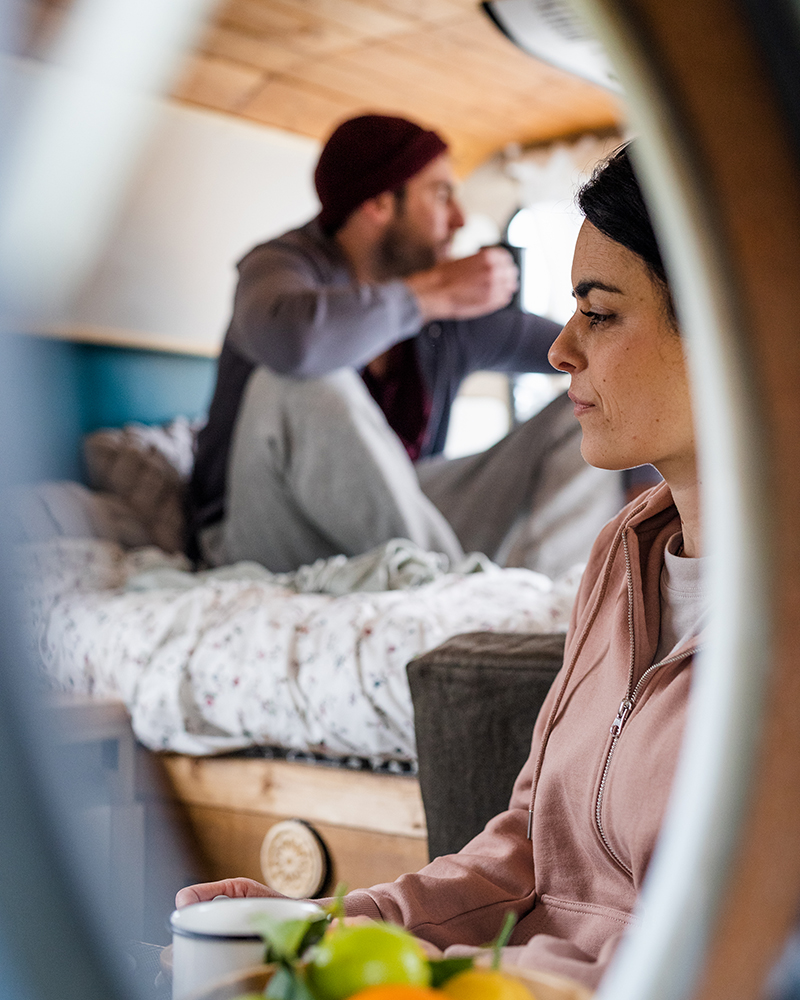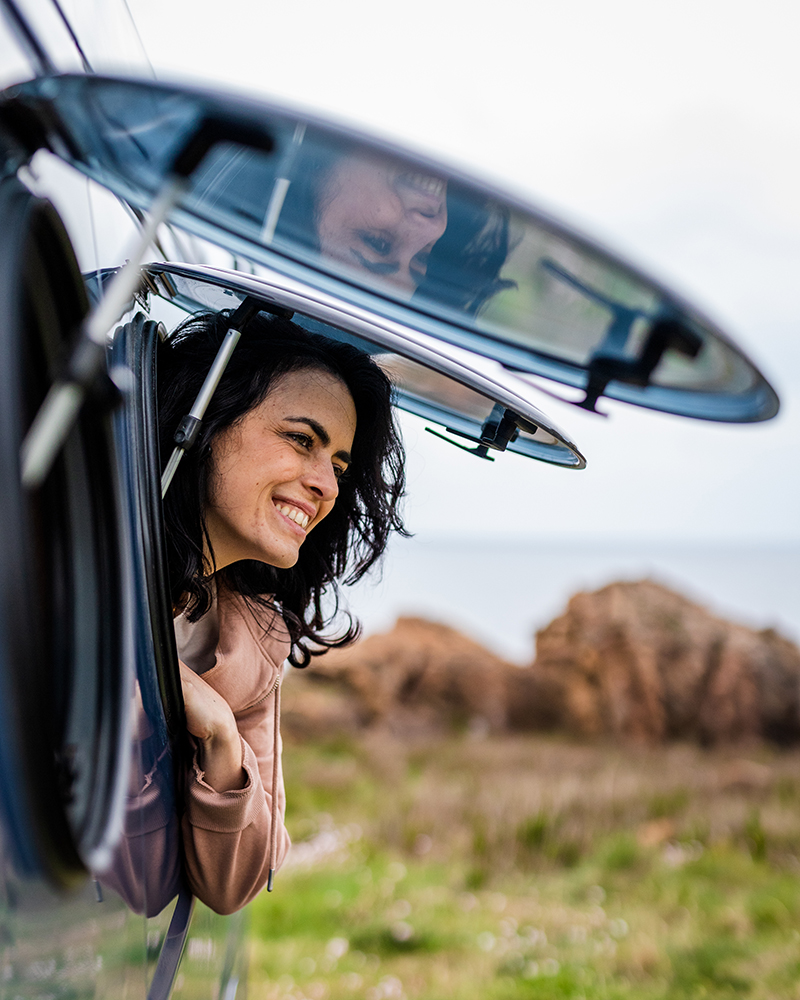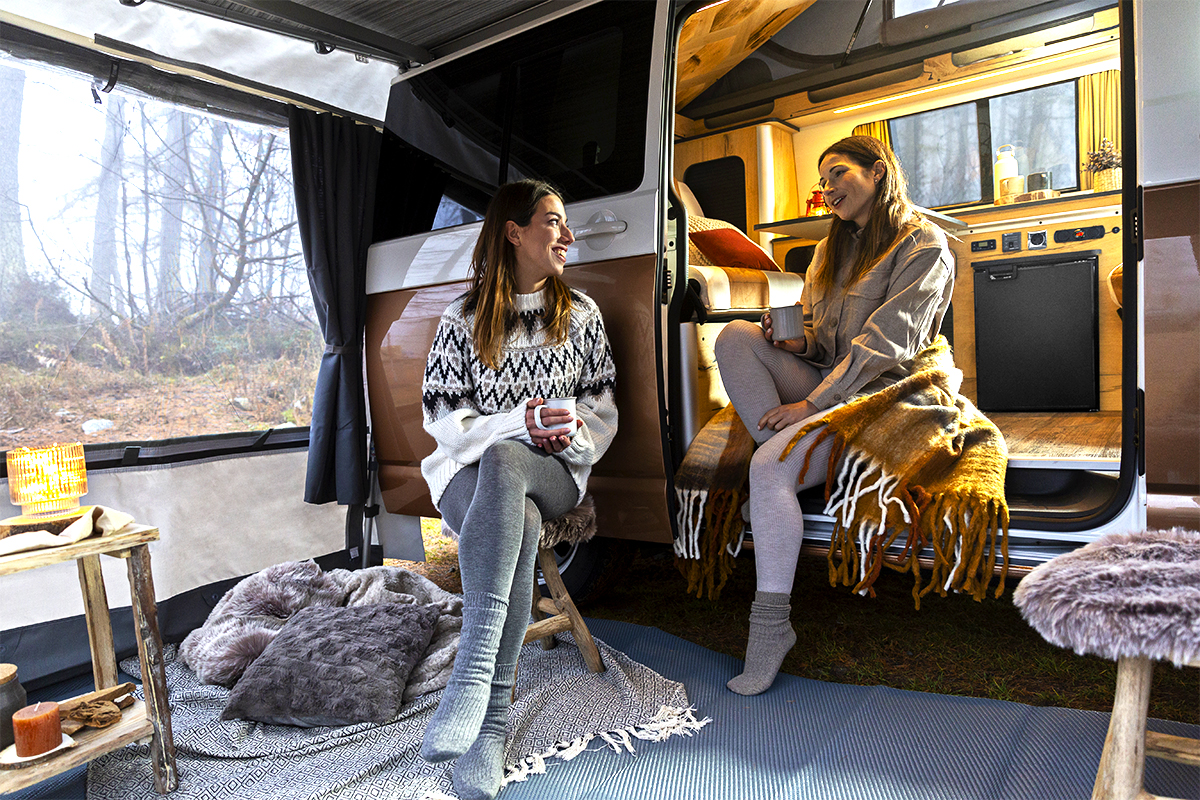How wonderful is van life! Freedom, adventure, close contact with nature, filling your eyes and heart with places that are different, every time without the need for reservations, living simply and sustainably. We talked in a previous article about why this way of life has become so popular in recent years and why more and more people are choosing vans, but today we want to go into a little more detail. How do you turn a van or commercial vehicle into a home on four wheels? Is converting a van (i.e. homologating a commercial vehicle as a camper van) really as simple as it sounds on social media? What are the pros and cons of this conversion? Find out with us!


What it means to “Camperise” a van.
“Camperising a van” means converting a commercial vehicle into a camper van, i.e. a leisure vehicle with space in which it is possible to live, sleep and cook. This conversion involves the addition of numerous components and equipment that make the vehicle suitable for camping and long-distance travel.
How to convert a van into a leisure vehicle
Camperisation can be carried out by specialised companies or done DIY, depending on the skills and resources of the van or van owners. This conversion provides a versatile vehicle for camping and travelling, offering greater autonomy and comfort during road adventures.
The modifications that need to be made during the conversion phase can vary greatly depending on personal needs, budget and vehicle type. In any case, these listed below are usually the most common.

Creating the sleeping area
The installation of foldaway beds or sofas, to create sufficient space inside the vehicle for sleeping, is a fundamental element. You will have to study well the position of the beds, depending on how many people will have to sleep in the vehicle.
Kitchen installation
The creation of a kitchen with a gas or electric cooker, a sink and a refrigerator for preparing meals is among the stages of motorhoming that require the most attention, especially with regard to the safety factors. Drinking water tanks and filtration systems for daily use must also be included.
Converting a bathroom in the van
Converting a van necessarily includes a toilet and shower system, depending on the space available. Fiamma has created a practical portable toilet system for on-board hygiene in vans, motorhomes, vans and caravans. Take a look.
Heating and cooling systems
The installation of a heating system and or air conditioners to regulate the temperature inside the motorhome is very important and is a complex choice that should not be underestimated. We will look below at how to set up electrical appliances inside your motorhome.
Storage and furnishing systems
Creating storage space for camping equipment, clothes and other personal items is of no small importance, especially when one considers how many people will inhabit the van.
The electrical system for the van
Power sockets, lights and USB sockets to power electronic devices must necessarily be installed on the van in order to make the best use of every device in the van. But how to regulate consumption? The maximum voltage inside a van depends on the electrical system and the devices to be installed in the vehicle. In general, in a recreational vehicle such as a camper van, the electrical system operates at low voltage to ensure safety. The typical voltage inside a van therefore varies between 12V and 24V, depending on the system and requirements.
What precautions to take when installing electrical devices on the van
Electrical appliances, such as the refrigerator, microwave oven or air conditioning, may require different voltages. We suggest having 12V or 24V auxiliary batteries (often two 12V batteries connected in series) to power lights, USB sockets, the refrigerator, the heater and other low-voltage devices. In addition, to power 120V or 220V AC (alternating current) devices, an inverter can be installed that converts the direct current (DC) of the auxiliary batteries into alternating current (AC). Finally, the best option is to install solar panels to generate and store electricity for use inside the vehicle. The voltage produced by the solar panels will depend on the specific configuration of the system.
The thermal insulation of the van
Finally, it is essential that your vehicle is well insulated to protect its ‘occupants’ from both heat and cold. It will therefore be necessary to install interior thermal insulation to improve comfort, without forgetting the ventilation system (Fiamma has also thought of this).
What are the advantages of converting the van?
The ‘pros’ of camouflaging a van or commercial vehicle are many. First of all, the possibility of maximum flexibility and freedom: a camper van gives you the freedom to travel and stay wherever you want, to live in the open air in contact with nature without having to book accommodation. You can explore remote and rarely visited places whenever you wish, without necessarily having to find a dedicated area, in every season.
Cost savings are also an advantage to consider. If used frequently, a camper van can help you save on accommodation and catering costs, especially if you love camping.
Freedom also means being able to take your pet with you everywhere. Finally, a converted van becomes a real home and can therefore be customised to suit your tastes and passions.

The cons of motorhoming
Finally, let us see what the disadvantages of trying to homologate a commercial vehicle into a motorhome may be
The initial costs
Converting a van can require a significant initial investment, especially if additional comforts such as a bathroom or a full kitchen are desired.
Maintenance costs
Vans, motorhomes, minivans and caravans require regular maintenance, both for the vehicle itself and for internal systems such as plumbing and electricity.
Laws and regulations
In Italy, for example, it is forbidden by law to convert a light commercial vehicle into a motorhome by means of a fixed set-up. The risk is not only a fine, but also the withdrawal of the vehicle registration certificate. Each installation must therefore be removable.
Fuel consumption
It should be borne in mind that a campervan consumes much more fuel than a car, so the costs of refilling your vehicle will be rather high.
Parking Space
Finding parking space can be a problem in some areas, especially in cities or crowded tourist spots.
To sum up, converting a commercial vehicle into a motorhome can be worthwhile if you love travelling and spending a lot of time outdoors, especially if you plan to do this often or even live in your van. However, this choice requires careful planning and a significant initial financial investment. Before deciding, we recommend that you carefully assess your personal needs and travel habits!
